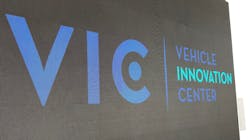New Flyer of America Inc., in partnership with Motor Coach Industries Inc., opened the doors to the Vehicle Innovation Center (VIC) in October 2017. At the VIC’s opening ceremony, NFI Group CEO Paul Soubry summed up what the facility was designed to be — not a museum for technology, but a “dynamic, interactive and progressive place” where public transportation innovation is driven through learning, sharing and collaboration.
The VIC holds a five-point mission:
- Advance bus and coach technology through sustainable research and development, fresh innovation, progressive manufacturing and bold thinking.
- Foster dialogue through discussion, education and training on the latest zero-emission, connected and autonomous driving vehicle technologies.
- Engage learning through current and interactive exhibits, simulation and hands-on experiences and observations.
- Generate energy and commitment to clean air quality, safety and economic benefits for people, communities and business.
- Harness the positive influence of collaboration, environmental stewardship and social change to advance smart mobility solutions.
What a visit to the VIC in Anniston, Ala., is not is an extended sales pitch, with training held at the facility four times per year at no charge to the industry. To date, the facility has hosted more than 1,300 attendees, and 350 industry professionals have completed its two-day “Essentials of Electric Bus Technology and Deployment” training.
“Whether new, somewhat familiar or highly experienced with electric buses and charging systems, VIC visitors will be exposed to the newest innovations and latest technology breakthroughs which are transforming transit,” explained David Warren, director of sustainable transportation at New Flyer.
The facility and training program are designed to offer a balance between education and collaboration with what New Flyer called “long-term solutions” on display. The 30,000-square-foot facility houses classrooms, an interactive technology exhibit space, demonstrator buses, the New Flyer Institute Manufacturing Lab, charging and hands-on training bay, engineering testing area, battery assembly area and a full-size transit bus simulator.
“New Flyer’s Vehicle Innovation Center provides a truly unique and valuable experience that can be summarized in three components: 1) Hands-on learning with vehicles, chargers and all-electric accessories, 2) Thoughtful classroom to share knowledge and exchange perspectives, 3) Exposure to new analytical tools needed by decision makers and transit agency operators to plan, design and implement a zero-emission bus system to its greatest potential,” said Warren.
The training session curriculum includes an overview of the electric bus evolution, an introduction to lithium-ion battery technology, discussions on energy consumption and route modeling, as well as planning and deployment of charging systems, automated technology, safety and maintenance and diagnostics. The session also incorporates several demonstrations such as New Flyer’s new SmartRiderTM Easy Access Level Boarding system, a ride and drive on an Xcelsior CHARGETM bus, a tour of New Flyer’s Anniston Manufacturing facility, which is located on the same property as the VIC and, what was a highlight of a recent trip by the Mass Transit team, a chance to get in the driving simulator and learn about electric bus regenerative braking.
There are two training sessions remaining in 2019: June 18-19 and Sept 24-25
About the Author

Mischa Wanek-Libman
Group Editorial Director
Mischa Wanek-Libman is director of communications with Transdev North America. She has more than 20 years of experience working in the transportation industry covering construction projects, engineering challenges, transit and rail operations and best practices.
Wanek-Libman has held top editorial positions at freight rail and public transportation business-to-business publications including as editor-in-chief and editorial director of Mass Transit from 2018-2024. She has been recognized for editorial excellence through her individual work, as well as for collaborative content.
She is an active member of the American Public Transportation Association's Marketing and Communications Committee and served 14 years as a Board Observer on the National Railroad Construction and Maintenance Association (NRC) Board of Directors.
She is a graduate of Drake University in Des Moines, Iowa, where she earned a Bachelor of Arts degree in Journalism and Mass Communication.
